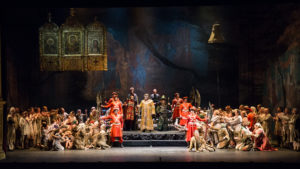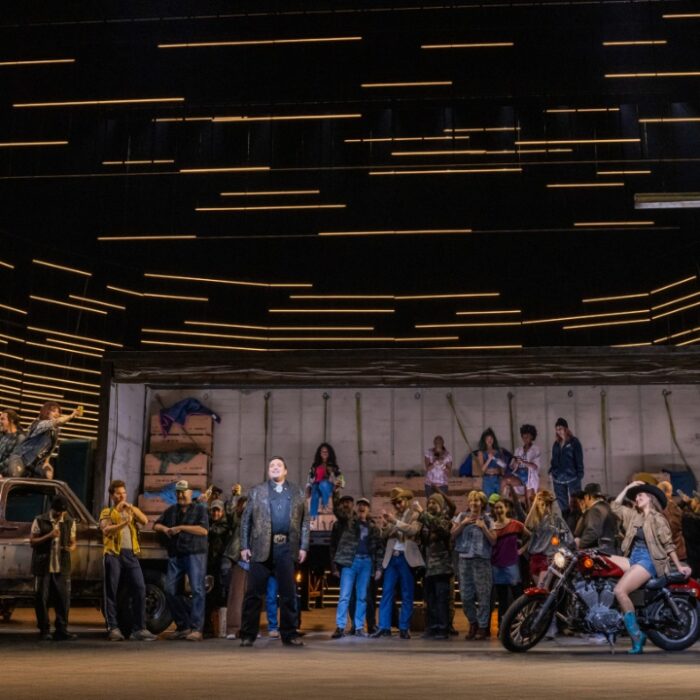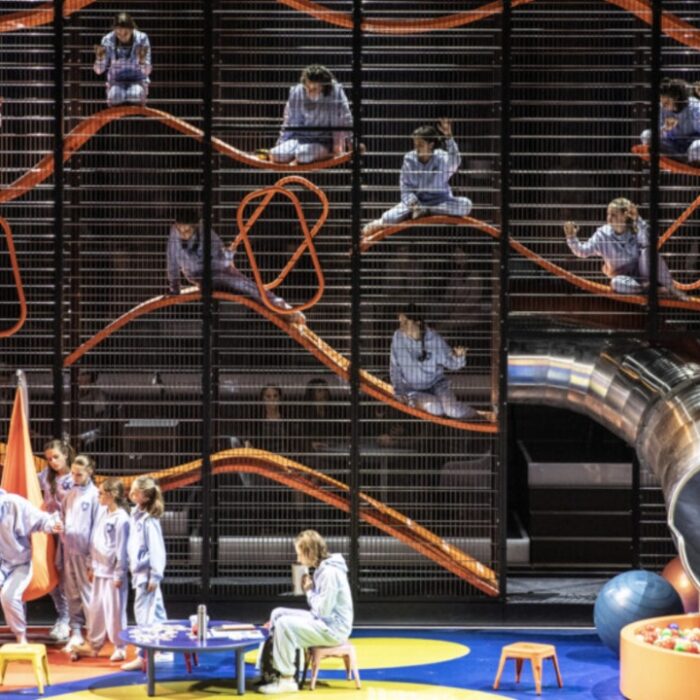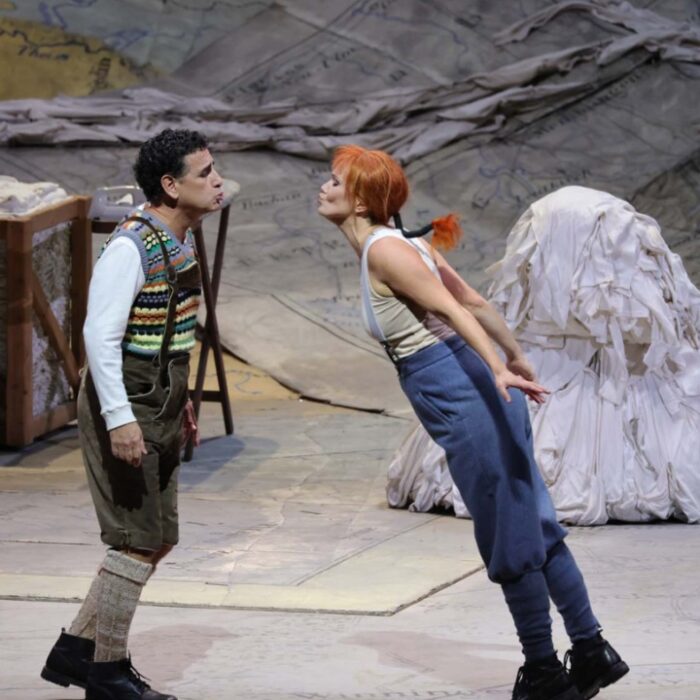
Teatro Lirico Giuseppe Verdi Di Trieste 2019-20 Review: Boris Godunov
Boris’ Personal Tragedy Highlighted In A Colorful Production
By Alan Neilson(Credit: Fabio Parenzan Visualart – Teatro Verdi Trieste.)
Teatro Lirico Giuseppe Verdi di Trieste’s staging of “Boris Godunov” was an imported production from the Dnepropetrovsk Academic Opera and Ballet Theatre of Dnipro in the Ukraine, originally directed by Yurii Victorovych Chaika, with Trieste supplying the orchestra and part of the chorus, under the musical director, Alexander Anissimov.
Given the work’s complex compositional and performance history, settling on a version to bring to the stage can be problematic. The Foundation Teatro Lirico di Trieste and Anissimov decided on a hybrid production, which starting with the 1872 version with a number of cuts to the text and the roles of minor characters made to sharpen the narrative and highlight the position of Boris.
Rangoni, the Jesuit convert, who wanted to use the pretender Grigory to promote Catholicism in Russia was completely deleted, thereby shortening Act three, which was collapsed from two to a single scene. Act four was reordered so that the opera ended with Boris’ death, which in certain respects took the libretto back to the 1869 version.
The effect was to focus the drama more narrowly, and to highlight the the roles of Pimen the monk, the wily old boyar Shuisky, the pretender Grigory and, of course, Boris himself, which allowed the tensions between the characters to be given greater weight.
It is also changed the nature of the work in the sense that this was now less about the social and historical forces that defined Russia during the period, and more about Tsar Boris’ personal tragedy; the opera ends with his death! The retention of the Polish scene did give a sense of the wider picture, but shorn of Rangoni it lacked substance, and became more of love scene, albeit a complex one, while the role of the Russian people was well-handled, and provided a convincing social context to the drama, it was used primarily as a backdrop, and ceased to have a role beyond the death of Boris.
Ultimately, the production shifted the emphasis from a portrait Russia with the role of Boris at its heart to one focused on Boris with Russia providing a colorful context.
Colorful Indeed
And it was, indeed, color that was one of the defining features of the staging, designed Anatoly Arefev. Each scene was constructed, with exception of Pimen’s dark cell and the small inn on the Lithuanian border, so as to magnify the visual impact. Gold and red dominated, both for the costumes and scenery.
The costumes, also designed by Arefev, were traditional and historically appropriate: Boris was dressed, as expected, in a full-length gold tunic, the boyars with large brown fur hats, in a variety of colorful heavy Russian clothing, the peasants in yellow/brown rags, the police in red, the high clerics of the Orthodox church in stunning vestments, and so on. They all crowded onto a tiered stage for the big scenes, with drapes featuring orthodox imagery covering the background, with a large bell hanging to one side.
Although it was spectacular and could not fail to impress, it probably had more in common with the historical epics of 1950s Hollywood than Russia at the beginning of the 17th century.
The director for this production, Victoria Chernova, did a good job in defining the characters and their relationships, although in some instances there was a tendency to rely on stock gestures. Boris and Shuisky in particular were expertly portrayed, and their complex relationship neatly fashioned so that Shuisky’s manipulations and Boris’ frustrations were clearly brought to the fore. The comedy scene in the inn involving Vaarlam, Misail, Grigory and the Landlady was cleverly constructed and brought a degree of levity to presentation.
Musically, Anissimov stuck with the 1872 version, although for the “Polish scene” it was decided to use the Rimsky-Korsakov’s revision. This proved to be an excellent device for contrasting traditional Russia with the more western, sophisticated Polish court; while Mussorgsky’s music has an urgent and raw quality, Rimsky-Korsakov’s music is more refined and learned.
Under his baton the Orchestra del Teatro Lirico Giuseppe Verdi di Trieste produced a fine reading of Mussorgsky’s stunning score, in which the thinner textures (compared to Rimsky-Korsakov’s revision) were beautifully managed, and the dark colors expertly captured. The rawness, even crudity, which Anissimov elicited from the orchestra not only enhanced the dramatic impact of the staging, but brought so much more life and immediacy to the work, confirming the genius of Mussorgsky’s score.
Throughout the performance Anissimov maintained a careful balance so that the principal singers were never overwhelmed by the orchestra and large chorus, although arguably, he was too careful at times and could have allowed the orchestra to play with greater strength.
The Core of the Story
Given the nature of the production, it was essential to have a strong personality in the role of Boris, and the bass-baritone Volodimir Gudz fitted the bill splendidly, producing a nuanced and well sung portrayal, in which he was able to carry both the authority of his position and his personal anxieties, which ultimately descend into fixation and his death.
His singing was expressively intense, founded upon his forceful, flexible and well-supported voice, although occasionally he did exhibit too much vibrato. Always attentive to detail, Gudz inflected his singing and acting with the necessary passion, but never overstepped the line by descending into clichéd gestures. In the final act, he managed bring together his fears, his guilt and anxieties in a well-crafted reading, culminating in his death.
In the role of Pimen, Victor Shevchenko was excellent. Shevchenko possesses a firm, strong bass, replete with an array of dark shadings. The vocal line is totally secure, which he accented with beautiful colourings and nuanced emphases. He was a self-assured and confident, declaiming his lines with a passionate intensity, which brought his Act one telling of the Tsarevich’s death at the hands of Boris, “I arrived at night,” thrillingly to life.
The pretender to the throne, Grigory, was played by tenor Vitalij Kovalchuk. Unfortunately, his portrayal was far too one-dimensional to convince. He has a strong voice with a bright tone, but did not employ sufficient variation, and produced a flat interpretation. Regardless of the dramatic situation he was strident, earnest and relied on big gestures.
The tenor Eduard Srebnytskyi, essaying the role of the wiley old boyar Shuisky, gave a powerful performance. His voice, now entering its twilight years, retains strength, although there was evidence of a certain degree of weakness in the vocal line.
Srebnytskyi, however, successfully incorporated the weakness into his portrayal and produced an expressive reading in which he gave voice to the deceptive and manipulating character. He also showed his experience of the stage with a strong acting performance.
Mezzo-soprano Kateryna Tsimbaliuk gave a polished performance as Marina. Although essentially introduced as love interest, Marina is an interesting character who makes little effort to hide her ambition beneath her apparent love for Grigorij. Tsimbaliuki’s versatility in the role captured the essence of the character: initially, she was haughty and demanding in her dealings with Grigorij, her voice razor sharp, but when she softened her voice bloomed, her phrasing becoming sweeter, smoother and more attractive. The shift in personality was complete.
The two ne’er-do-well monks Varlaam and Misail were played by the bass Alexander Prokopenko and tenor Igor Tishkov. They made a splendid team, intuitively complementing each other in their drunken stupidity. Prokopenko’s larger-than-life portrayal along with his imposing physique allowed him to dominate their relationship. He produced an expressively and confidently sung performance. Tishkov feigned a whining voice, and knew exactly how to get the most from his role as a sidekick.
The mezzo-soprano Anna Evtekhova joined in the comedic shenanigans with a lively portrayal of the inn’s hostess. She has a strong stage presence which brought the role alive and, moreover, really appeared to be enjoying herself in the process. She showed considerable ability in characterizing through the voice, her phrasing displayed nuance and an awareness to the meaning of the words.
The Tsar’s two children, Feodor and Xenia were played by mezzo-soprano Kimika Yamagiwa and soprano Yuliya Lytvynova. Both sang well, Yamagiwa giving a fresh-faced and suitably young sounding impression of the Tsarevich, while Lytvynova gave a solid performance of the young princess, in which her pleasing tone and clear phrasing stood out.
Tenor Ruslan Zynevich made an excellent impression in a well-acted and convincingly sung portrayal of the Holy Fool, perfectly capturing his innocent, feeble-minded character.
Other notable performances came from soprano Svetlana Soschneva who essayed the role of the nurse sympathetically, and the bass Igor Dudin who gave a fearsome portrayal as a police officer.
The Coro del Teatro Lirico Giuseppe Verdi di Trieste combined with the chorus of the Dnipro Opera and the children’s chorus of I Piccoli Cantori della Città di Trieste, under the management of chorus mistress Francesca Tosi. The large choral scenes were breathtakingly executed, the singing was skilfully rendered and the acting well-choreographed.
Overall this was a fine production, boasting some excellent singing with an interesting orchestral interpretation which worked well. Dramatically, however, it was not as successful; the staging was certainly very colorful, but may be too Hollywoodesque, for some tastes, to fully convince. And although it was interesting to get to the heart of Boris’ personal anxieties, it sacrificed the wider historical sweep which makes “Boris Godunov” such a special work.



